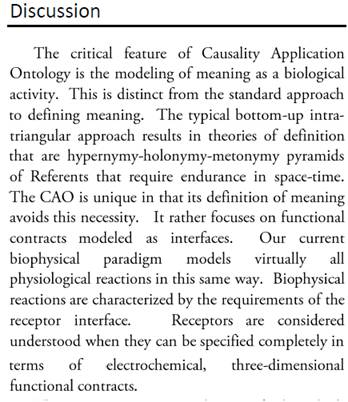Of all the opinions I have heard yet about the many
ways of distinguishing Individuals from the other sorts of names you use in
your Ontology, this is the one I like best. It is a fair-use snippet from
his paper
“The Causality Application Ontology” by Samuel
Richard Dismond III who authored it.

I particularly like the fact that he uses the NAMEs,
not the DEFINITIONs, to make distinctions within the domain’s universe of
Individuals. That is a better approach because it is easier to
communicate among other human beings on the team
who also have to consider your own peculiar Q&As, adapt
to the Q&A, and produce singular Q&As for you as instances of
activities and ICOMs, interconnected as needed to perform the function. Then
said instance of an activity communicates right back to you in said instance’s
own peculiar Q&A ways.
I like that kind of design iteration between people
pairs that makes up the development process. It is that two way person-to-person
link that differs in practice ontology from that of theory ontology. Theorizing
isn’t Actualizing; the description is not the deed. And as always,
the Actual (the measured reality situation at the moment t) can be compared to
the Goal situation (using variables, constants, relations, functions and
unification constraints).
If everything is OK (Goal matches Actual), they will
be identical (Goal=Actual) so there is nothing new to do. Otherwise, any
difference from Goal toward Actual could be set as a subgoal in a Self.Instance,
or not, depending on the domain of interest. Recurse until
satisfied. Then stop.
On this list we seem to debate various properties of Theorized
categories. Actually experienced categories are the ones which people
(agents, whatever) have experienced in reality.
The aforesaid Samuel Richard Dismond, III had the
luxury of naming each of his personal conceptions with the words he used
iteratively and often to think and communicate with others in his domain.
He then wrote interpretations of each class and its components in his own
vocabulary of word uses and names. That made the ontology he developed
(the CAO) consistent logically because he could use a single language (his own
peculiar one) with its own peculiarities and differences among other classes
and components. That is a singularly linguistic corpus, by my personal
definition.
But note that he didn’t start by writing any
logic equations to get the ontology finished! Instead, he relied on
meditation, a singularly Individual subjective thing. Later he wrote down
the Situation he himself existentially occupied in the meditation. When
it had been experienced vividly enough, he was able to describe it
linguistically, and then later perhaps logically.
Logic is useful in describing the results of
meditation, but the experience of that meditation, experienced by a singularly
Individual thing yourself, is detailed by experience. This microcosmic,
yet mutually consistent Situation, is an Individual, at least in my own lexicon.
That is how I describe it. I model every situation
using an IDEF0 context and decompositions, objects that I have experienced in
detailed ways in this context.
I would design an agent as an IDEF0 activity with its
Inputs being
the Goal (a control
input), the Actual, being both the Input input and the Mechanism input. Then
develop decompositions of the IDEF0 activity with whatever constants,
variables, knowledge base, etc. Add And/Or graph search with unification
within Context, and with IDEF0 visual and verbal interaction styles. Fly free
young agent! Within this context, that is.
-Rich
Sincerely,
Rich Cooper
EnglishLogicKernel.com
Rich AT EnglishLogicKernel DOT com
9 4 9 \ 5 2 5 - 5 7 1 2
-----Original Message-----
From: ontolog-forum-bounces@xxxxxxxxxxxxxxxx [mailto:ontolog-forum-bounces@xxxxxxxxxxxxxxxx]
On Behalf Of John F Sowa
Sent: Wednesday, December 19, 2012 10:23 AM
To: ontolog-forum@xxxxxxxxxxxxxxxx
Subject: Re: [ontolog-forum] Fwd:
Ontologies and individuals
On 12/19/2012 3:56 AM, Chris Partridge wrote:
> I know you [Pat] have an irrational aversion to
these topics.
That remark is uncalled for. Pat has a very
strong understanding
of the issues and requirements for a good
design. But he has even
less patience than I have for endless quibbling over
words.
> My and, I'm guessing, Matthew's experience is
that these kinds of
> structures are a useful practical device when
dealing with large systems.
Structure is *extremely* important. Pat and I
were not complaining
about any proposed structures. We were
complaining about endless
debates about common English words that are overloaded
with confusing
and conflicting definitions.
My solution is simple: whenever a word creates
more confusion than
enlightenment, delete it. If you can't state a
precise definition
in terms of the logic used to specify the ontology,
then the word
is too vague and misleading for ontology design and
documentation.
> If you [Pat] are suggesting that the terms we are
using "cannot be
> described or named" maybe you should re-read
the literature.
Pat not only knows the literature, he has been making
important
contributions to it for over 40 years. The fact
that this thread
has been going around in circles for dozens of notes
without reaching
a precise definition of the word 'individual' implies
that the word
is more confusing than informative.
Simple solution: If knowledgeable people in the
field cannot agree
on a definition for a word, then don't use it.
By the way, I learned that lesson many years ago in a
project
at IBM. We had endless arguments about the word
'name'.
Our solution was to forbid any use of that word.
When we got rid of the word, we quickly discovered
that we all
had nearly identical intuitions about the *structure*
of the
architecture. The only arguments were about one
confusing word.
John
_________________________________________________________________
Message Archives:
http://ontolog.cim3.net/forum/ontolog-forum/
Config Subscr:
http://ontolog.cim3.net/mailman/listinfo/ontolog-forum/
Unsubscribe:
mailto:ontolog-forum-leave@xxxxxxxxxxxxxxxx
Shared Files: http://ontolog.cim3.net/file/
Community Wiki: http://ontolog.cim3.net/wiki/
To join:
http://ontolog.cim3.net/cgi-bin/wiki.pl?WikiHomePage#nid1J
